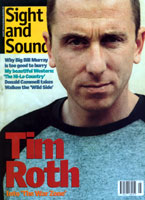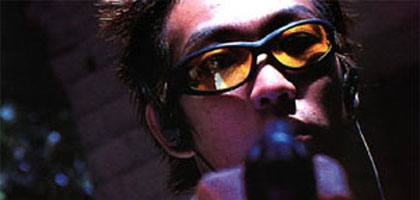Primary navigation

Hong Kong 1997

Reviewed by Tony Rayns
Our synopses give away the plot in full, including surprise twists.
Too independent to join a triad gang but happy enough to do odd-jobs for 'big brother' Cheung Siu-Wing, Moon lives in a resettlement-estate apartment with his mother; his father left and remarried some years ago. Out collecting debts for Cheung, Moon meets and befriends Lam Yuk-Ping, a girl who needs a kidney transplant if she is to live. The slightly retarded Sylvester comes upon the body of Susan Hui, a schoolgirl who has jumped from a roof, and pockets the two bloodstained letters he finds at the scene. He gives them to Moon, his friend and protector, who passes one on to its intended recipient (the teacher on whom Susan had a crush) but keeps the other. Moon starts having wet dreams, which he attributes to the presence of Susan's spirit in the apartment.
After a clash with Fat Chan, a loanshark menacing Ping's mother, Moon tries to raise money for Ping's kidney transplant. He steals his mother's savings, provoking a row witnessed by his social worker Ms Lee. Soon after, Moon's mother leaves. Moon agrees to carry out a murder for Cheung for big money. Armed, he stalks the targeted businessman but cannot bring himself to shoot. Fat Chan vengefully sends a kid to kill Moon, who is rushed to hospital with multiple stab wounds. On discharge, Moon learns Sylvester has been killed by Cheung (angry at his failure as a drug courier) and that Ping has died for want of a kidney donor. He shoots Cheung and then ambushes and shoots Fat Chan. He delivers Susan's letter to her mystified parents (it now carries postscripts from Ping and himself), goes to Ping's grave and shoots himself in the head.
The production history of Made in Hong Kong has attracted as much attention as the film itself. Fruit Chan, a long-serving assistant director in the Hong Kong film industry who had directed one commercial quickie in 1991, began planning it in 1994 and started saving short-ends from films he worked on. He shot it over two months at the end of 1996 on a borrowed budget of around US$80,000, using a crew of five and a cast of non-professionals. The movie-star/singer Andy Lau (the sailor in Days of Being Wild) provided a production office and other material support; the post-production was assisted by director/distributor Shu Kei. The finished film was rejected by the Hong Kong Film Festival in April 1997, but went on to triumph on the international festival circuit. Both Chan and lead actor Sam Lee are now much in demand in what remains of the film industry.
In short, Chan's film was the first Hong Kong feature which could be called an 'indie' in the sense that the Sundance Festival once meant it, but the film is smart and accomplished enough to deserve better than to be treated as an enterprising novelty. Chan's background in the industry inflects it at every level. It's at once an insider's attempt to unlearn some bad industry habits, a professional's bid to beat commercial rivals at their own game, and an outsider's criticism of the ways the industry has glamorised the current generation of juvenile delinquents. Another independent director coming to this project without Chan's history behind him certainly would have made a very different film.
There have been juvenile-delinquent movies in Hong Kong cinema at least since 1960, when problem-teenager Bruce Lee was redeemed by rediscovering his long-lost father in Lee Sun-Fung's The Orphan/Renhai Guhong, and Made in Hong Kong echoes some aspects of that tradition - for instance, in its rather desultory sketch of Moon's social worker Ms Lee. More recently, though, there has been an entire subgenre of 'triad kid' movies. Andrew Lau and Manfred Wong's Young and Dangerous/Guhuozai series, which ran to five episodes plus a couple of spin-offs and a prequel, was founded on the notion that it's okay to idolise 'good' triads as heroes. Cha Chuen-Yee's diptych Once Upon a Time in Triad Society/Wangjiao Cha-fit-ren parodied and ridiculed that notion, and then the rest of the industry pitched in with the usual mix of rip-offs, imitations and comic variations. Until Moon gets trigger-happy in the closing scenes, Made in Hong Kong offers a wry, realist riposte to all these films.
The riposte is not principally a matter of style or idiom. Chan uses the same resettlement-estate and playground locations as other 'triad kid' films, and he's not shy of flashy tracking shots, 'dramatic' compositions or slow-motion climaxes. The difference is rooted in his attitude to his main characters. The film is centred on Moon's consciousness. We see everything through his eyes (even scenes in which he isn't present are presented as Moon imagines them) and hear his thoughts and comments in voiceovers. And the key to the film's success is Moon's complexity and credibility as a character, presumably the result of input from both Chan and his phenomenal discovery Chan-Sam Lee. Neither mindless gang fodder ("I won't kill or risk my life because I'm ordered to - that's dumb,") nor a stereotypical rebel (he treats adults as fallible equals, not authority figures to be challenged), Moon is bracingly real. In everything from his unconsummated sex games with Ping to his sentiment-free attitude to Sylvester and his movie-fed gun-craziness, he's a likable screw-up who might have got ahead if he weren't so deeply convinced that he's "fated" to have bad luck.
Ping and Sylvester are equally believably drawn, but Moon inevitably dominates the film. One episode among many serves to illustrate why the character and the film impress so strongly. When he realises his mother has walked out, Moon's first impulse is to blame his father for breaking up the family in the first place. He takes a kitchen chopper and heads for his father's new home. But dad is out, so he has to hang around. He's in a public toilet when an adult comes in, followed by a schoolboy who stabs and cuts him, accusing him of destroying his family by raping his own daughter. Only the schoolboy's parting shot reveals that he's the man's son. Witnessing this, Moon thinks twice about attacking his own father. Aside from being a deliberately shocking scene, this neatly sidesteps all generic expectations - not to mention psychoanalytic clichés. That's the essence of the film's freshness, and the reason why it established Fruit Chan overnight as a director of substance and great promise.